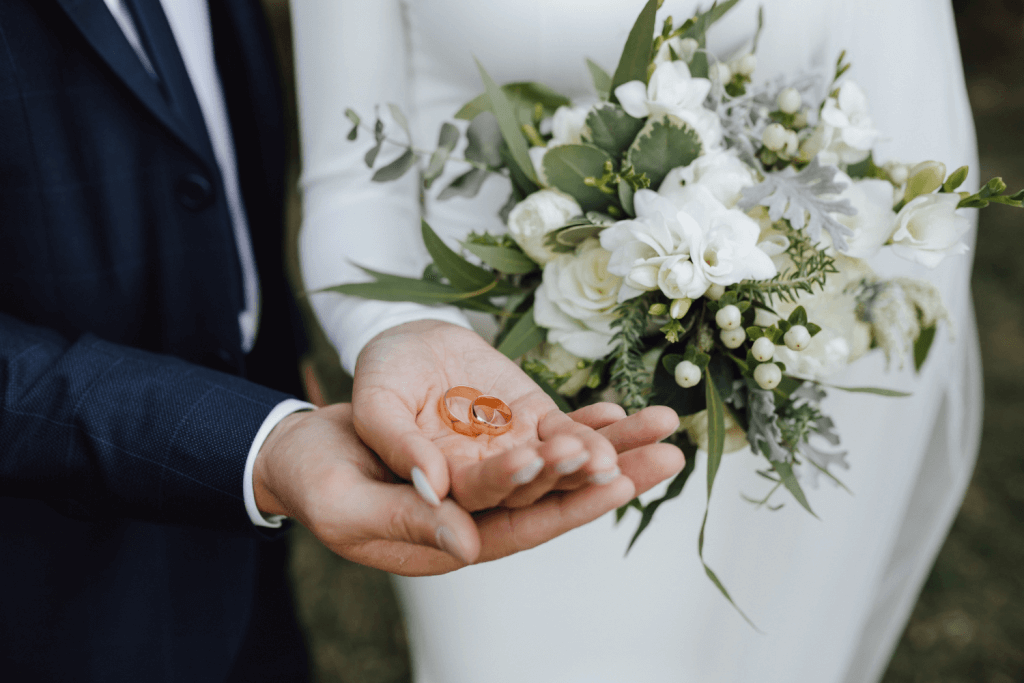
Want to know how much the average wedding costs this year? Introducing Bridebook’s UK Wedding Report 2024: our annual wedding industry study revealing year-on-year changes. This year was our biggest and best yet: we surveyed almost 6,000 married and engaged couples (2,000 more than 2023), representing a mix of regions and demographics, to find out what couples like you are spending on. Time to get planning your own wedding budget…
Average Cost of a Wedding in the UK
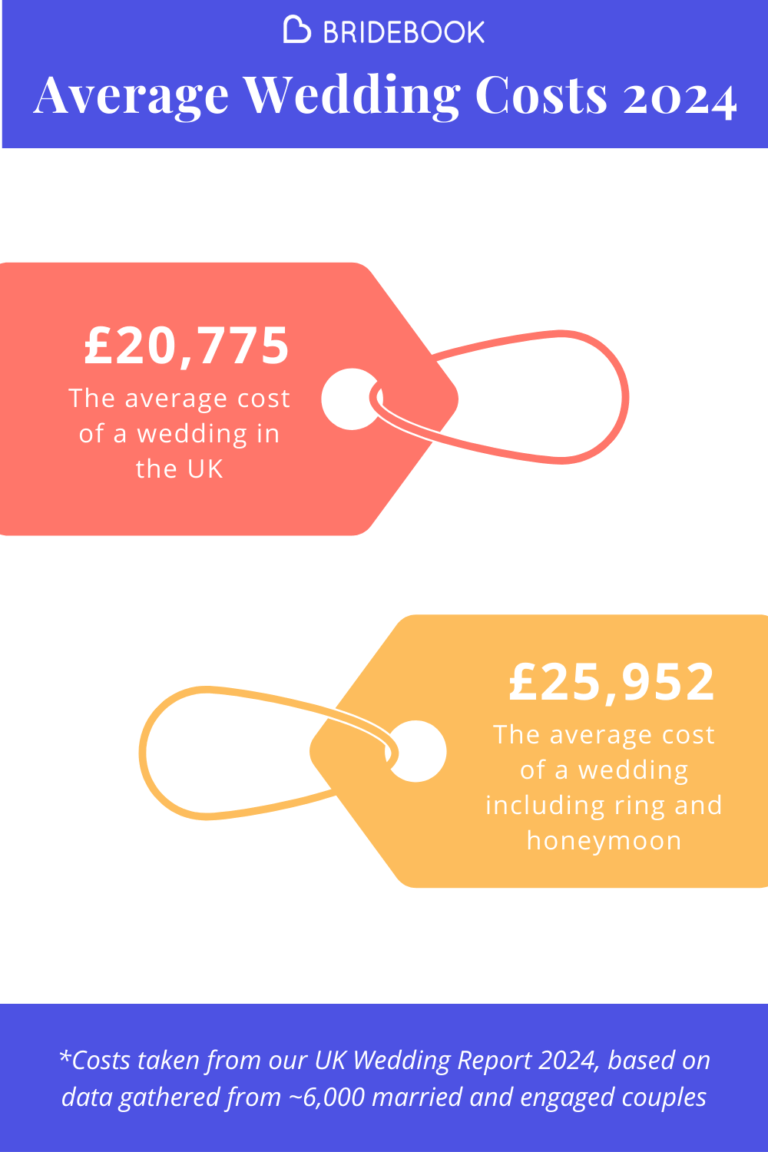
Despite the cost of living crisis, wedding spending rose £1,500+ year-on-year to £20,775 as the average total UK wedding cost, surpassing £20,000 for the first time. The figure rises to £25,952 including the engagement ring and honeymoon.
Looking ahead, we see younger Gen Z couples more affected by the economic climate. Yet rather than reduce spending, these couples expect to spend £4,000 more on their weddings. This willingness to spend more reinforces the importance couples place on their wedding. They’re also finding ways to save with second-hand items like upcycled decor, or by reselling items.
Average Wedding Costs by Supplier Category
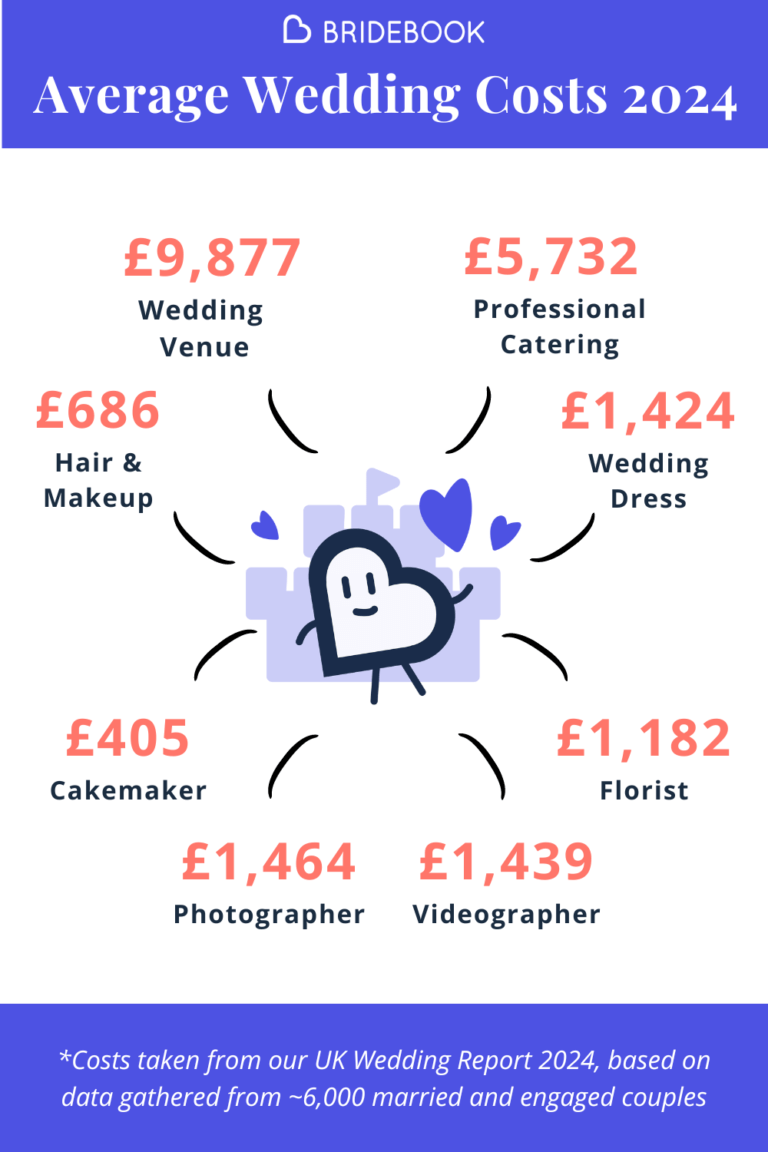
Average wedding spend increased in almost every category between 2022 and 2023. The most significant cost is that of the wedding venue (£9,877 average with catering, and £6,084 without catering, representing 25-50% of the total wedding budget). We’ve put together a wedding cost breakdown below! These are the average supplier costs for UK weddings in 2024, split into helpful categories:
Venue and catering
- Average cost of a wedding venue – £9,877 (+ catering) / £6,084 (- catering)
- Average cost of wedding catering – £5,732 (professional) / £1,097 (speciality)
Photography and videography
- Average cost of a wedding photographer – £1,464
- Average cost of a wedding videographer – £1,439
Flowers and cake
- Average cost of a wedding florist – £1,182
- Average cost of a wedding cakemaker – £405
Beauty and fashion
- Average cost of wedding hairdressing – £358
- Average cost of wedding makeup – £328
- Average cost of a wedding dress – £1,309
- Average cost of wedding menswear – £764
- Average cost of wedding fashion and accessories – £285
- Average cost of wedding jewellery – £2,089 (engagement ring) / £1,021 (other jewellery)
Music and entertainment
- Average cost of wedding music – £1,127 (reception) / £641 (ceremony)
- Average cost of wedding entertainment – £727 (non-music)
Decor and hire
- Average cost of professionally printed wedding stationery – £384
- Average cost of wedding decor and hire – £1,449
- Average cost of a wedding marquee – £4,202
- Average cost of wedding transport – £705
Other wedding costs
- Average cost of wedding favours – £158
- Average cost of a wedding planner – £2,436
- Average cost of a celebrant/toastmaster – £501 (celebrant) / £515 (toastmaster)
- Average cost of a honeymoon – £4,329
If you’re looking to save money on your suppliers, savvy wedding planning is a must! Our top tip is to enquire to several suppliers to do more price comparisons.
Total Wedding Costs by Region
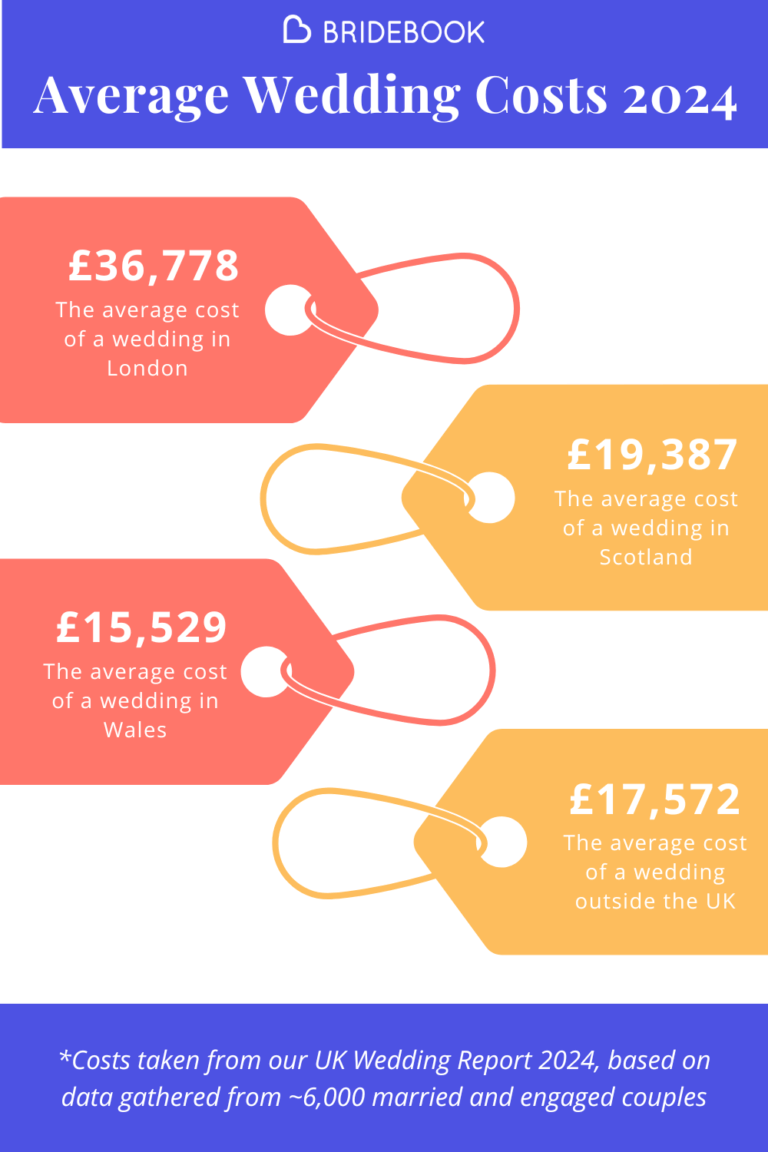
Couples are now spending over £15,000 (or 77%) more to marry in London (£36,778) compared to the national average (£20,775). That’s significantly more than couples who marry outside the UK, where the average cost is £17,572 (that’s 15%, or £3,000, less than the total UK average). Both Wales (£15,529), and Yorkshire and the Humber (£16,612), are the regions with the lowest costs, making them the most budget-friendly options. So, if you’re looking to save money on your wedding, the location can make a huge difference!
Total Wedding Costs by Day of the Week
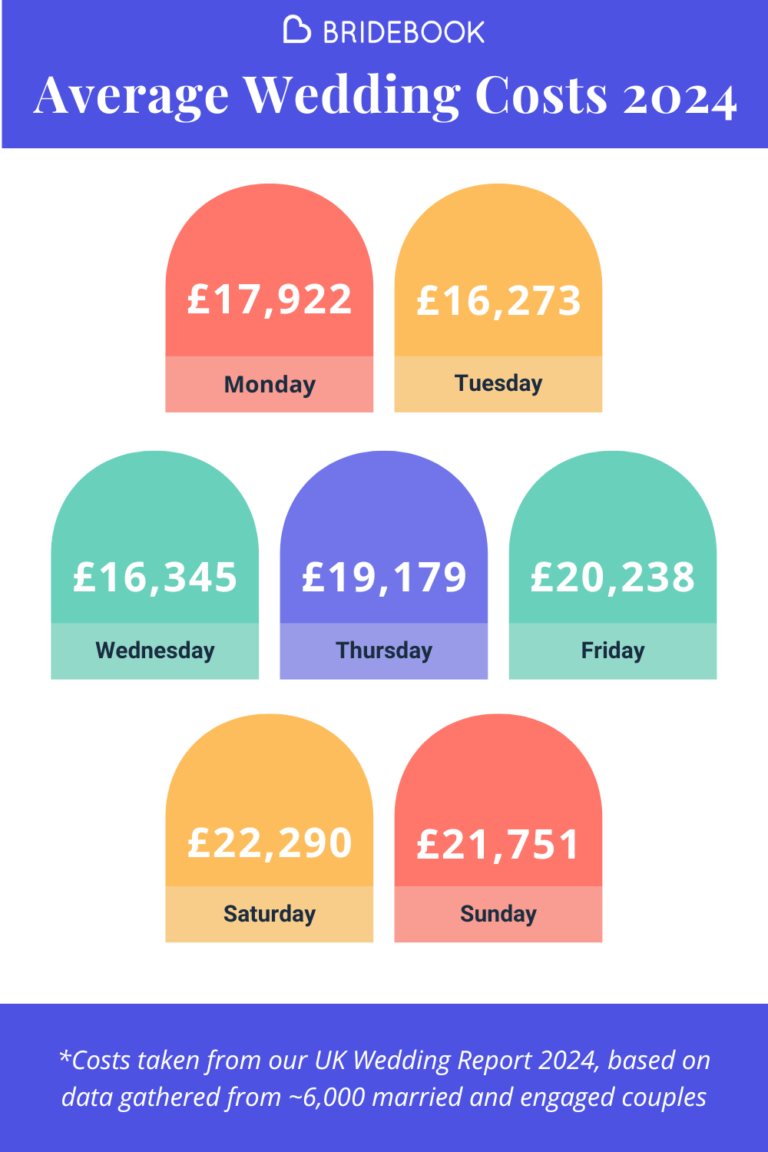
Weekend weddings remain the most expensive, with Saturday weddings costing £22,290 on average (7% above average), and Sunday weddings £21,751 (5% above average). Tuesdays (£16,273) and Wednesdays (£16,345) are the least costly options (~20% below average). So, if you’re on a budget and looking for a cheaper alternative, consider a midweek wedding. This can hugely cut costs!
- Monday – £17,922
- Tuesday – £16,273
- Wednesday – £16,345
- Thursday – £19,179
- Friday – £20,238
- Saturday – £22,290
- Sunday – £21,751
Total Wedding Costs by Month of the Year
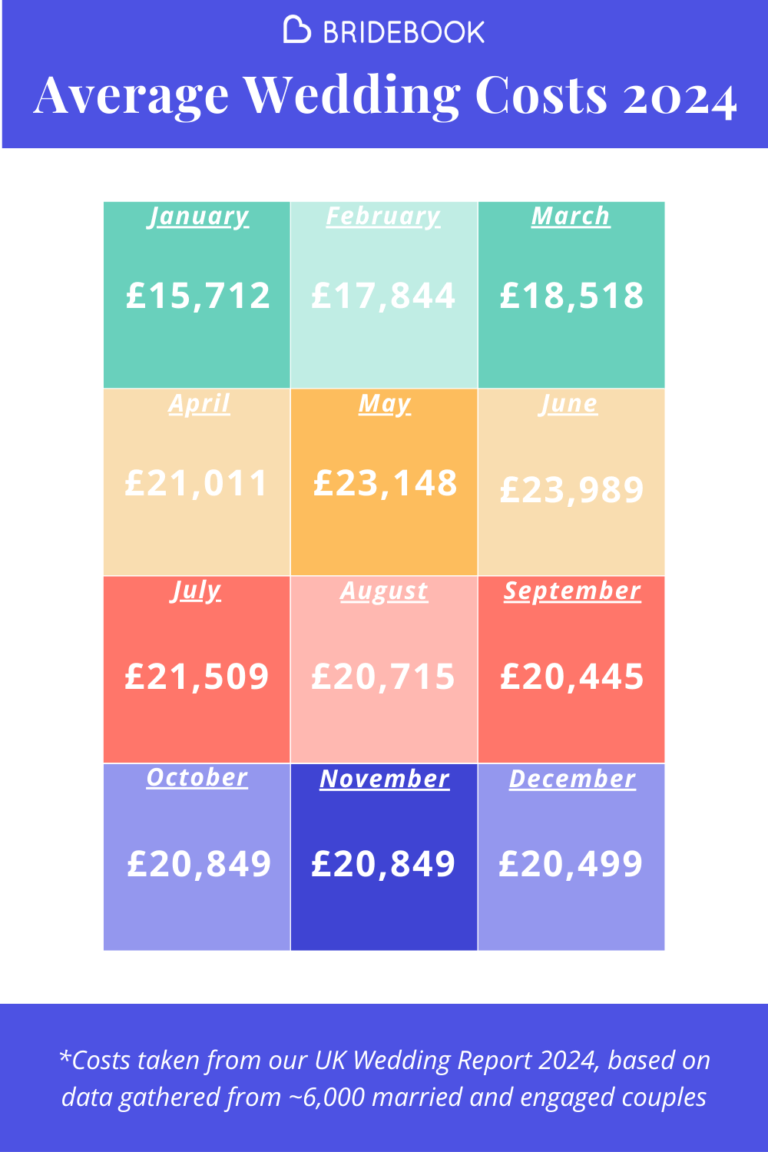
Wedding costs tend to be highest from May through August, with May (£23,148) and June (£23,989) weddings costing 11-15% above the average. Costs are lowest in the winter, with January (£15,712) and February (£17,844) being the cheapest months in which to tie the knot (24% less than the UK average). So couples can expect to splurge to marry in the summer months, and save by marrying in winter. This continues the seasonal trend of previous years.
- January – £15,712
- February – £17,844
- March – £18,518
- April – £21,011
- May – £23,148
- June – £23,989
- July – £21,509
- August – £20,715
- September – £20,445
- October – £17,991
- November – £20,849
- December – £20,499
Total Wedding Costs by Guest Count
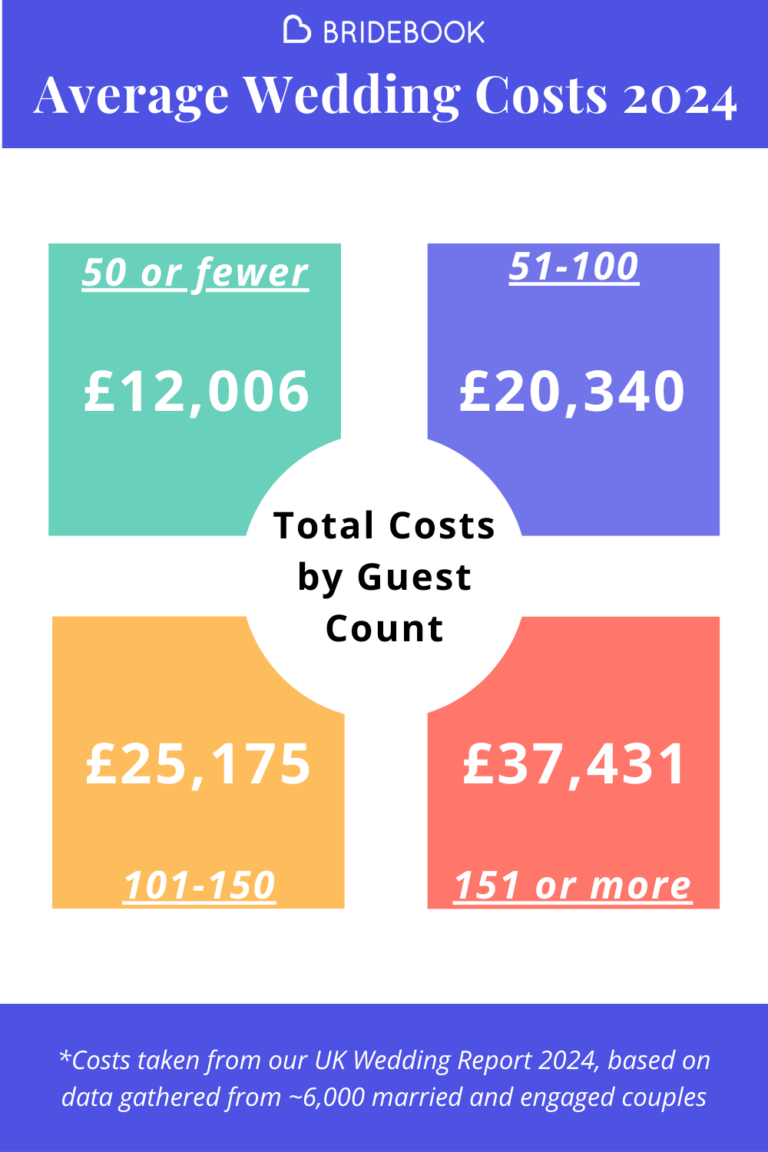
Headcount can significantly influence wedding spending. The more guests you invite, the more your wedding will cost. This rise is primarily due to catering needs. So, if you’re looking to cut costs, consider having fewer guests to feed. Couples who host 50 guests or less spend 42% less on their weddings than the average. By contrast, couples who host 150 guests or more spend 80% more.
- 50 or fewer guests – £12,006
- 51-100 guests – £20,340
- 101-150 guests – £25,175
- 151 or more guests – £37,431
The Bottom Line on Average UK Wedding Costs
So, if you’re planning on celebrating a wedding in 2024, you’re looking at an average spend of £20,775, up £1,500 year-on-year. The average cost may be more or less depending on the region, day of the week, month of the year, and any other personal preferences and priorities (for example, which supplier professionals you want to book rather than DIY, or how many guests you’re prepared to cater for). For a more thorough category-by-category breakdown of the cost of UK wedding suppliers, check out our article on the ultimate wedding budget breakdown. And for a budget breakdown that’s tailored for you, look no further than Bridebook’s one-of-a-kind personalised wedding budget planner.
You Might Also Like…
- How Much Does a Wedding Cost? The 2023 UK Average
- The Ultimate Wedding Budget Breakdown
- Introduction: Your Wedding Budget
- How to Save Money on Your Wedding: The Ultimate Cost-Cutting Guide
- Hidden Wedding Costs Every Couple Needs To Know About
- How to Ask Your Parents for Wedding Money
Happy Planning!



